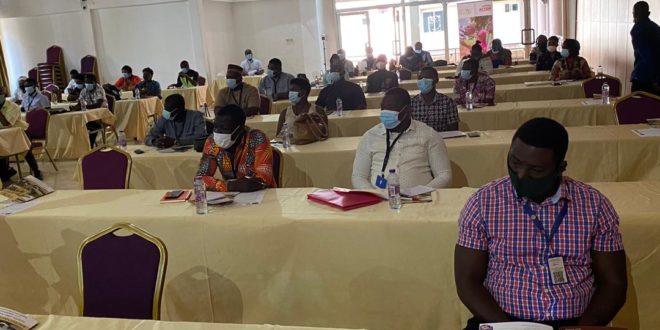50 Small and Medium-scale Enterprises (SMEs) engaged in shea-based cosmetic processing in the northern cluster have undergone capacity-building training on labelling and standard compliance in the Tamale Metropolis.
The training was organized by the Global Shea Alliance (GSA with funding support from the West Africa Competitiveness Programme (WACOMP) – Ghana which is funded by the European Union and implemented by the United Nation’s Industrial Development Organization (UNIDO).
The training in collaboration with the Food and Drugs Authority (FDA) and Ghana Standard Authority (GSA) through the WACOMP – Ghana Sub -Contracting Matching Scheme is the second of its kind, geared toward increasing the quality of the shea-based cosmetics products that are marketed for local and international consumption.
Mr Charles Kwame Sackey, the Chief Technical Advisor of WACOMP-Ghana said the sub-contracting matching scheme in support of the training is to help ensure the cosmetic producers understand the registration process and related requirements by the Ghana Standards Authority (GSA), Food and Drugs Authority (FDA) as they seek to grow their domestic market share and export their products to the international market.
“This will, in turn, strengthen the export competitiveness of local producers through enhanced value-addition, low carbon emission, sustainable production and processing, and an increased access to regional and international markets,” he said.
Mr Sackey also reminded the SMEs of the opportunity the African Free Continental Trade Area (AfCTA) offers and why they must always produce to meet the required quality standards.
Mr Prince Nunoo, Membership Manager of Global Shea Alliance (GSA) said the alliance will continue to support shea -based SMEs to be sustainable and reiterated that the collaboration between WACOMP-Ghana and GSA will continue to help scale-up businesses in Ghana.
Mr Martin Kusi, the Northern Regional Director of the FDA commended the organizers for the initiative, stating that poor labelling and packaging represents one of the biggest challenges for shea-processing SMEs in the region, as it affects the marketability of their products.
“Most of the local entrepreneurs are seen producing ineffective labels without batch numbers, manufacturing dates, location address and other relevant details. This makes it difficult for GSA management to certify the products for the market,” he said.
Mr Charles Kuranchie, Chief Quality Assurance officer at the GSA, stressed that it is an offence to put products on the market without preapproval by the FDA and GSA. He added that there are severe legal repercussions for breaching this directive.
 Home Of Ghana News Ghana News, Entertainment And More
Home Of Ghana News Ghana News, Entertainment And More




